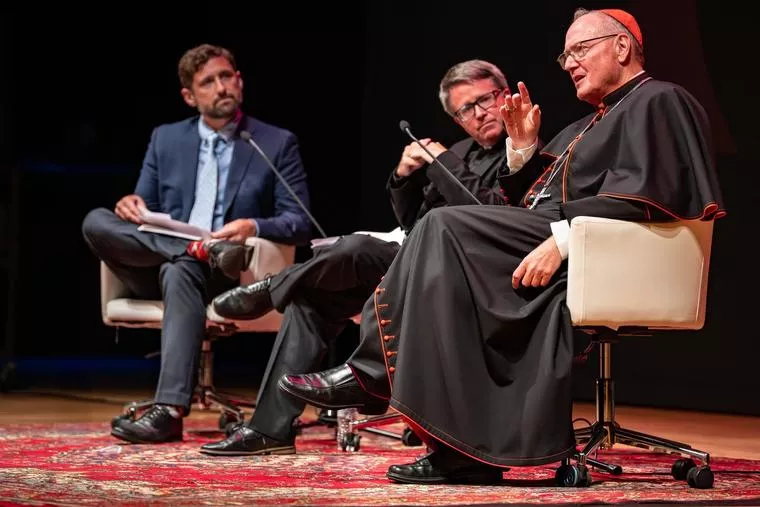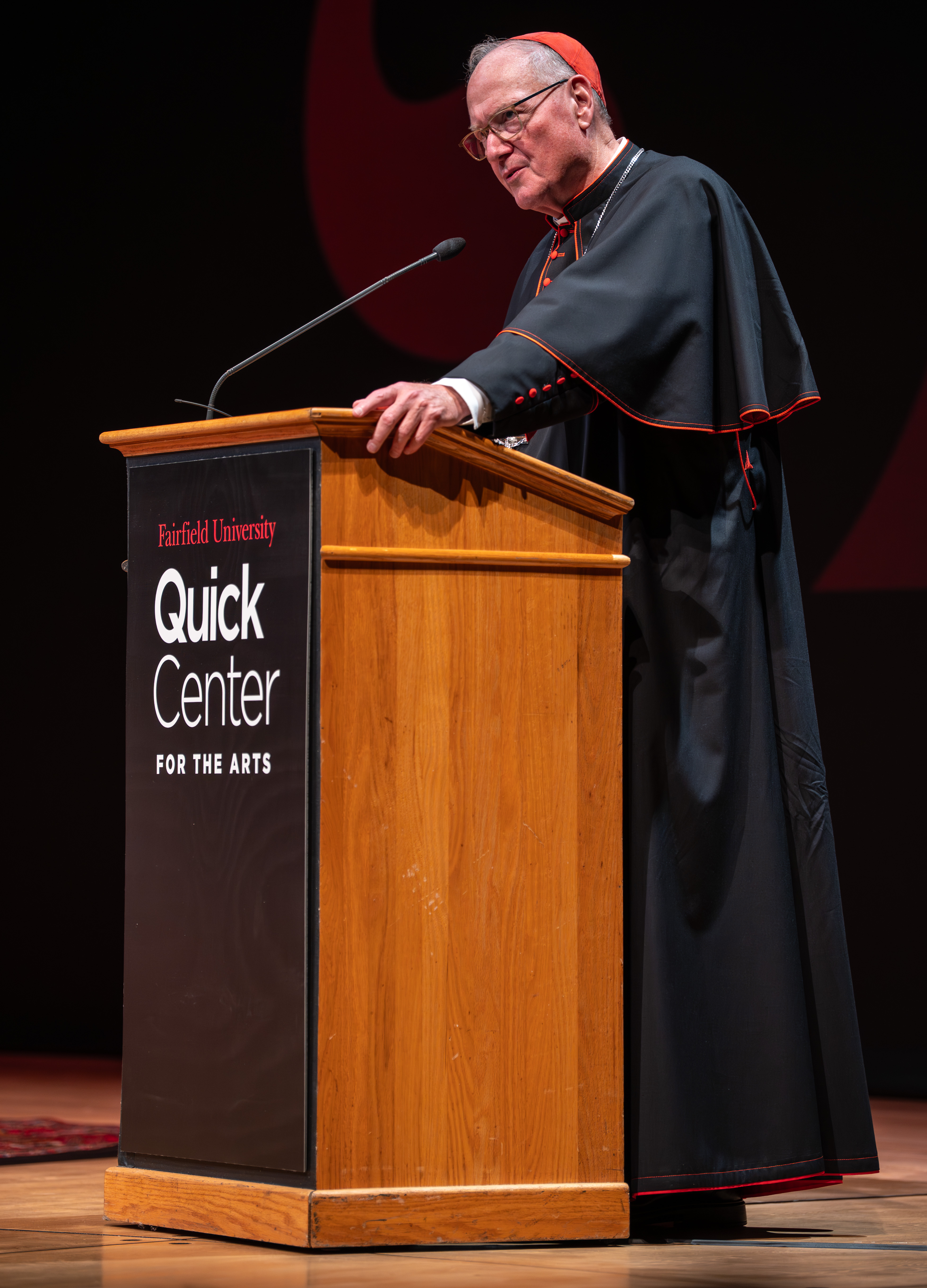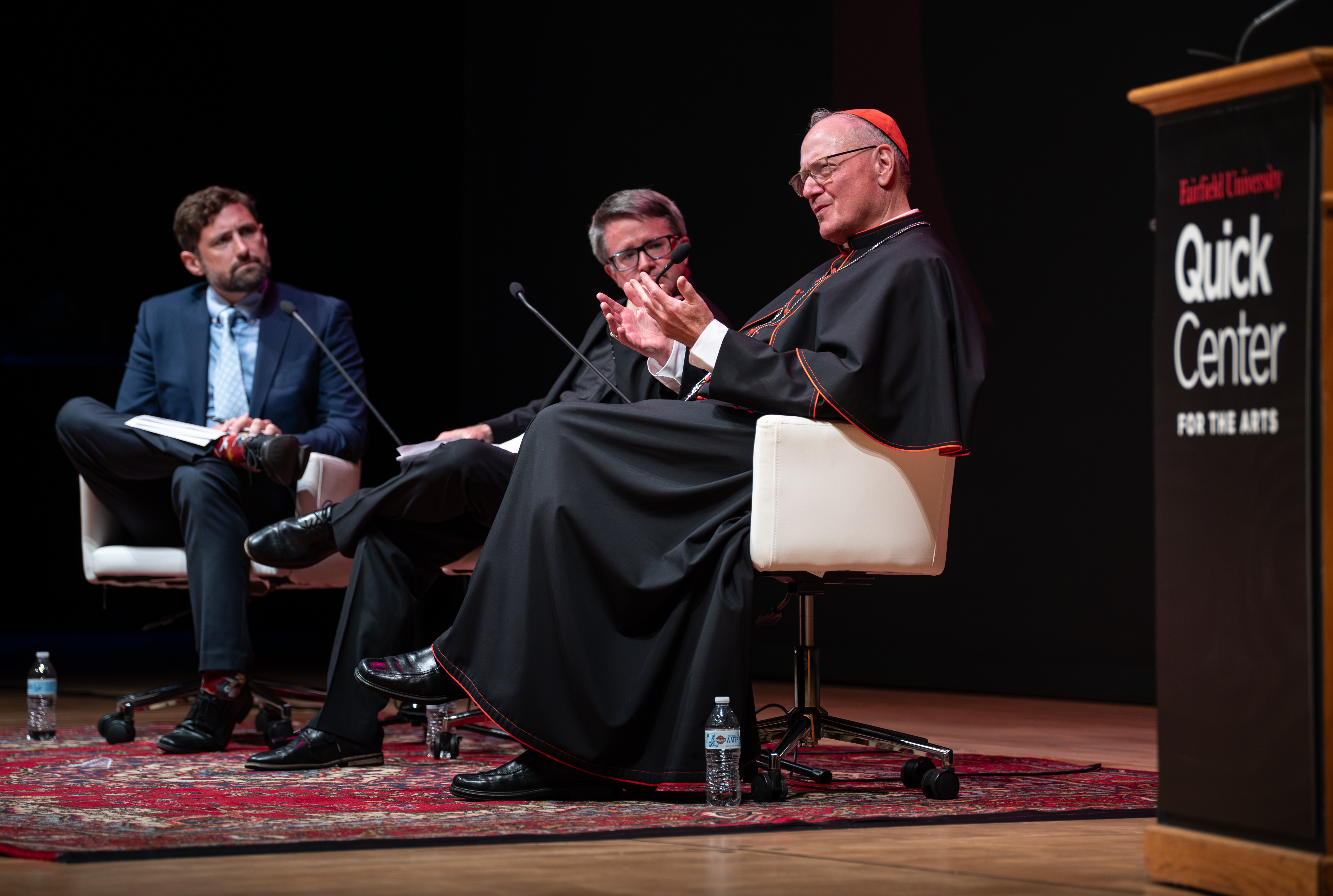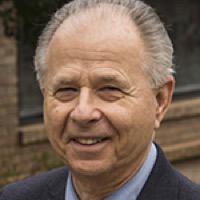
FAIRFIELD, Conn. — “Look, I can't talk about the inner workings of the conclave, but …I can tell you right off the bat that I was used to it because I lost in 2013, as well,” Cardinal Timothy Dolan, archbishop of New York, joked to a packed theater at Fairfield University, where he appeared on Sept. 4 for an “Evening with Timothy Cardinal Dolan: Reflections on the Conclave and the New American Pope: Leo XIV.”
Cardinal Dolan did more than the title promised with his recollections, insights and sprinkles of humor. First reminding everyone of the oath he and other cardinal electors take not to divulge the workings in the conclave, he continued to share what insights he could, focusing on steps leading to the conclave and then much about Pope Leo XIV and his three predecessors — all in his erudite, colorful way.
“It's impossible to appreciate Pope Leo without at least a glance at the three pontiffs who preceded him,” the cardinal said. In a previous talk elsewhere on the conclave he “stumbled upon a hermeneutic that shows one part of the human makeup, each to describe John Paul, Benedict, and Francis: namely, soul, head and heart.”
He detailed each.
First, to the soul, examining St. John Paul II’s “Be not afraid” and what that meant for souls and the Church. Next Benedict, “a man never shy about reminding us that faith and reason were intimately allied and who “rescued reason from the heap, and recycled it, exalting humanity's predisposition to dream and imagine and think and reflect, leading to that nobility instilled within us at the very instant of our creation.” Then Francis, with a “heart, beating with love and tenderness and humility and mercy. This bishop of Rome from Argentina, revised that heart.”

Cardinal Timothy Dolan speaks to the crowd gathered at Fairfield University Sept. 5, 2025.(Photo: David C Gray)GrayPeak Images
Cardinal Dolan continued, “The Church is referred to as the Mystical Body of Christ. So if she's a body, she needs a mind, and a heart.” How Pope Leo XIV fits this analogy was waiting in the wings.
Cardinal Dolan shared some details and insights about the daily meetings in the congregation before the conclave.
“The first time, I was a rookie. I was a cardinal for only a year, and I was largely ignored,” he said of the 2013 congregation. This time he knew many cardinals from his and their extensive travels and meetings in New York and elsewhere. “Thus, this time, I was surprised that many of my brother cardinals actually asked my advice on things,” he explained.
He shared some observations he believed pertinent. Among them, this gathering of cardinals “was novel after the death of Pope Francis” because of dozens of cardinals from surprisingly new areas of the world — including Mongolia, Oceania and India, plus smaller dioceses in every corner of the globe. “These newbies were particularly keen on consulting us veterans about … ‘What are we supposed to do here?’”
Importantly, “There is no campaigning that goes on. I hope you realize that. That movie [Conclave] was wrong, okay? There’s no campaigning,” he repeated. “The congregation meetings, and certainly the conclave itself, is not a political convention. Never is there any campaigning by any cardinal, although sometimes others from the outside would approach a cardinal to lobby for a particular candidate. No cardinal would ever present himself as a candidate. Yet, that having been said, there’s a lot of conversation about the challenges the new pontiff would and should face. And, yes, there is discreet discussion privately about which of the cardinals might have the qualities needed.”
For his part, “It was illuminating to hear my brothers speak of the challenges, the problems, the possibilities they discern in their own dioceses, our pastoral offices, and to offer hints about the qualities a new pontiff should possess,” he continued.
“We needed a pope with his heart, a successor who would keep emphasizing Gospel values,” he said, “an openness to dialogue and accountability, a care for the forgotten, a solicitude for the environment, a friendship with other faiths, a tenderness towards those who felt excluded, a prophet’s voice in defending those without one.”
“We were looking for a successor, not just a continuator: a successor not just to Pope Francis, but to St. Peter; for that matter, a successor to John Paul and Pope Benedict,” he added. “This was nothing new. Every conclave has the same challenge.”
Cardinal Dolan also found something very interesting. “From the start,” he explained, “I, for one, from the minute I walked in, I was asked a question, which I have to admit caught me off guard. You know what the question was? ‘Dolan, tell us about Cardinal Robert Prevost.’ Robert Prevost? Who’s he? I’m being honest here, folks. I’m embarrassed now to confess I didn’t know him well at all. See, they figured I would since he was an American.”
The cardinal shared what he did know in general about then-Cardinal Prevost’s great reputation as prefect of the Congregation for Bishops, his role with the Augustinians, and his admirable service as a bishop in Peru. Yet Cardinal Dolan admitted he knew of him, but with all the questions asked of him, he “figured I’d better get to know him quick. What seemed to be so appealing about Robert Prevost?” he observed.
The cardinal learned Cardinal Prevost “was described as sensitive, thoughtful, a calm listener, a hard worker, a sound manager, not adverse to tough decisions, with a keen knowledge of the Church universal and its diverse pastoral needs.” Cardinal Dolan realized he “did not belong to any of the groups of more ideological candidates the outside world had identified.”

Next, the cardinal did share a few details of what was permissible to say about being in the conclave with no way to communicate with the outside world. He recalled how he went very early for a conclave breakfast, complete with a cappuccino — and a preferred staple. “Learning from the past, I knew to bring my own emergency rations — namely, peanut butter. … I sat down by myself for breakfast with a jar of Skippy, only to be joined by a certain Cardinal Robert Prevost, who was attracted to my table, certainly not by me, but by the peanut butter, which I was sharing!”
Later, Cardinal Dolan happened to be sitting right behind this cardinal when the sacred moment came when Cardinal Prevost was asked: “You’ve just been chosen successor to St. Peter. Do you accept?”
“We held our breath, waited for the reply,” Cardinal Dolan recounted. “After applause, he replied. And we again teared up and applauded because, at that very moment, folks, the chair of Peter was no longer vacante, but plena. We listened again, as Cardinal Parolin asked, ‘And by what name shall you be called?’ ‘Leo,’ he replied to thunderous applause, again.”
Later, Cardinal Dolan reiterated that he hoped he “made clear there was a lot of human input into the meetings and conversations, yet the influence of the Holy Spirit was definitive.”
Cardinal Dolan tied Pope Leo to the body analogy he used for his three predecessors.
Recalling a Historic Moment
He pictured the new Pope heading to the balcony: “The Pope is coming. Soul, head and heart. What part of the human engine would I use to describe Pope Leo XIV? That’s a tough one, folks. … But I’ve discovered a word. It’s not an organ of the body, like head, heart; the soul isn’t an organ — but it is a feature of the body. And the word I’ve chosen is ‘temperate. temperate.’”
“Here is a man of calmness. The headline in the respected Corriere Della Sera, the morning following the white smoke, would read in big headlines, Abbiamo un Papa Calmo [‘We Have a Calm Pope’]. We’ve got a calm, measured, somewhat shy, unflappable, pensive, even-handed, diligent, not rash, not looking for drama, eager to listen and to work, to encourage, not so much to shake up [Pope]. That was his attractive temperament; a temperate man, not ordered by anxiety or passion, but by Jesus Christ. As St. Paul wrote, ‘I live now, no, not I, but Christ lives in me.’”
The cardinal continued, “Pope Leo seemed in a unique way to exude the characteristic of the patron of his religious congregation, St. Augustine, that the love of God revealed personally and passionately by his incarnate Son, Jesus Christ, was the identifying normative feature of his life, as it should be for us. This was his only agenda, evident from his first strong words to those half-million cheering folks in the square named after the first Pope.”
Christ-Centered Papacy
Cardinal Dolan added, “The name of Jesus was what he first said, to offer and to preach the Person, the message, the invitation of Jesus to a wounded Church in a messed-up world. This seems to be the only agenda of this new Pope. Just as Pope Leo XIII had done to an industrialized world, 125 years before, even more so, just as Pope St. Leo the Great had done in the generation after St. Augustine, to a world in chaos after the fall of the Roman Empire and the invasion of Attila the Hun. Because Jesus Christ is the Way, the Truth and the Life, the same yesterday, today and tomorrow. The answer to the question posed by every human life. That’s the temperament of Pope Leo XIV.”
The cardinal believes Pope Leo will have “a scholarly, not a bookish, style, but he would be thoroughly Augustinian, who, as you would know, is perhaps the greatest intellect in Western civilization.”
What is more, he added, “I don’t think he would ever want to shock. I don’t think he would ever want to disturb, except in a prophetic way, like Jesus could disturb and the prophets of the Old Testament could.”
The immediate few changes he made also spoke to Cardinal Dolan, one being his move to the papal apartments, which Pope Francis eschewed for the St. Martha guest house.
“He has a sense that, ‘I have received the office of Peter. Robert Prevost is no longer. Leo XIV, I am, and I am absorbed into a tradition and a papal office that is meant to serve the Church. It is not mine to tamper with,” Cardinal Dolan said.
He also underscored Pope Leo’s emphasis on Jesus, using a particular example. “He had a great speech the other day to Catholic Charities and relief workers, where he praised the work overseas, responding to the suffering of the world. Great praise. But he said, ‘You know, our first gift to people who are suffering is Jesus Christ. The bread that is most valuable that only we can give is the Bread of Life. We should never insult the poor of the world to think that they’re only happy with the material. They can go elsewhere for that. When they come to us, they want to hear about God. They want to hear about Jesus.’”
“So Pope Leo is saying that rather than the problem is the Person of Jesus; rather than issues is the dynamism of the Gospel that is very unified,” the cardinal said. “That’s all we can give,” he added, giving the example of Peter and James in the Temple Square being asked for alms by a beggar.
“When I read that,” concluded Cardinal Dolan, “he was saying, ‘Never, ever, ever be afraid to put the priority on faith in God and Jesus and his message. Jesus is the answer to the problem every human life poses.’”
This article was originally published on the National Catholic Register.

Joseph Pronechen is staff writer with the National Catholic Register since 2005 and before that a regular correspondent for the paper. His articles have appeared in a number of national publications including Columbia magazine, Soul, Faith and Family, Catholic Digest, Catholic Exchange, and Marian Helper. His religion features have also appeared in Fairfield County Catholic and in major newspapers. He is the author of Fruits of Fatima — Century of Signs and Wonders. He holds a graduate degree and formerly taught English and courses in film study that he developed at a Catholic high school in Connecticut. Joseph and his wife Mary reside on the East Coast.







